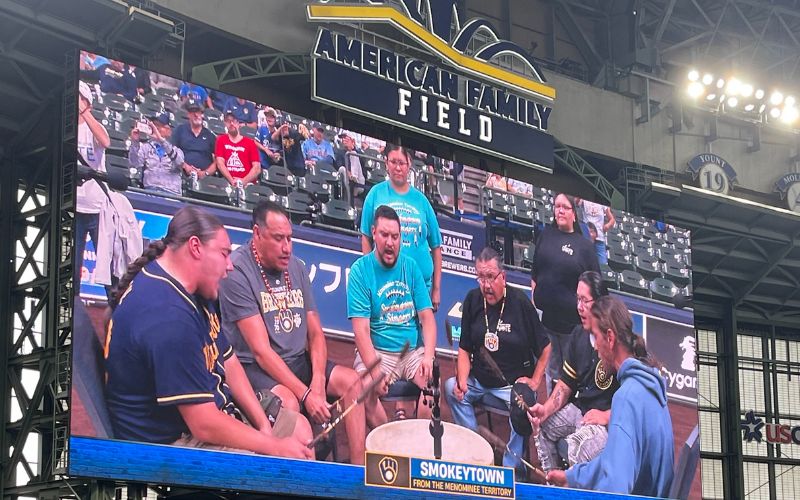
- Details
- By Kaili Berg
As Major League Baseball teams Milwaukee Brewers and the Los Angeles Dodgers prepared to face off, the tailgate featured a color guard, a performance by the Smokey Town drum group, and speeches from prominent Native leaders, including Mark Denning (Oneida), Anne Eagan-Waukau (Menominee), and Shannon Holsey (Stockbridge-Munsee Mohican).
The event also marked the first collaboration of its kind with the Milwaukee Brewers, who generously provided 1,000 game tickets to be distributed among Wisconsin’s tribal nations.
Holsey, president of the Stockbridge-Munsee Mohican Nation, shared the story of Louis Leroy, a member of her tribe who played for the Boston Red Sox in the early 1900s, but was denied the right to vote in U.S. elections because he was Indigenous.
“We have a powerful voice,” Holsey said at the event. “When we stand together, we can influence decisions that impact our people, our land, and our future. Voting is one of the most important ways to make our voices heard.”
Leroy’s story served as a reminder of the relatively recent history of Native voting rights. Indigenous peoples were not granted U.S. citizenship until 1924, and it took even longer for many to gain full access to the ballot.
Holsey also stated that Native military veterans, who have served at higher rates than any other group of Americans, played a critical role in securing these rights. She reminded the crowd that although it’s been 100 years since Indigenous peoples won the right to vote, the fight for full recognition of that right continues.
Denning, a speaker and educator, pointed out the challenges Native voters still face today, including difficulties using tribal IDs at polling stations.
“Use those tribal IDs when you vote,” Denning told the crowd. “Get those poll workers to use them. We should not have another young person voting in their first election and be told, ‘We can’t accept those.’ Yes, they can, they must. It is the law.”
Denning concluded the event with a call to action: “Vote for her,” a campaign started by Native girls across Wisconsin to honor those who came before and to protect the future of their communities.
“Vote for her. Remember her,” Denning said to the crowd. “Remember your mom that has passed. Remember your grandmother that could not vote, vote for her. Your vote matters. Make it count.”
Following the tailgate, attendees enjoyed a Milwaukee Brewers game. The Smokey Mountain Singers performed their flag song on the field, the color guard presented the tribes’ flags during the national anthem, and Urban Native Vote Organizer Anne Egan-Waukau (Menominee Indian Tribe of Wisconsin) threw the first pitch of the game.
As the November election approaches, Wisconsin Native Vote encourages all eligible Native voters to register and participate. For those looking to get involved, Wisconsin Native Vote offers resources and support to ensure every Native voice is counted.
More Stories Like This
Native News Weekly (August 25, 2024): D.C. BriefsUS Presidents in Their Own Words Concerning American Indians
Native News Weekly (December 28, 2025): D.C. Briefs
Minnesota Lt. Gov. Flanagan Draws Right-Wing Backlash After Wearing Hijab in Solidarity With Somali Community
Haaland Meets with Southern New Mexico Law Enforcement on Public Safety Priorities
Help us defend tribal sovereignty.
At Native News Online, our mission is rooted in telling the stories that strengthen sovereignty and uplift Indigenous voices — not just at year’s end, but every single day.
Because of your generosity last year, we were able to keep our reporters on the ground in tribal communities, at national gatherings and in the halls of Congress — covering the issues that matter most to Indian Country: sovereignty, culture, education, health and economic opportunity.
That support sustained us through a tough year in 2025. Now, as we look to the year ahead, we need your help right now to ensure warrior journalism remains strong — reporting that defends tribal sovereignty, amplifies Native truth, and holds power accountable.
 The stakes couldn't be higher. Your support keeps Native voices heard, Native stories told and Native sovereignty defended.
The stakes couldn't be higher. Your support keeps Native voices heard, Native stories told and Native sovereignty defended.
Stand with Warrior Journalism today.
Levi Rickert (Potawatomi), Editor & Publisher


